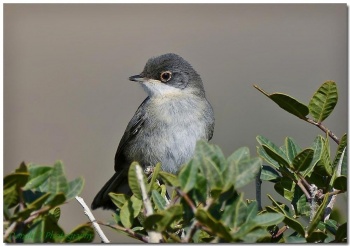- Curruca melanocephala
Sylvia melanocephala
Identification
13·5 cm (5¼ in)
Male
- Grey back
- White underparts
- Black head
- White throat
- Red eyes
Female
- Brown upperparts
- Buff underparts
- Grey head
Distribution
Europe and Asia, Africa, Middle East
Eastern Europe: Scandinavia, Norway, Finland, The Netherlands, France, Corsica, Portugal, Spain, Ibiza, Mallorca, Canary Islands, Gran Canaria, Gomera, Tenerife, Extremadura, Gibraltar, Monaco, Switzerland, Italy, Sardinia, Hungary, Slovenia, Croatia, Yugoslavia, Serbia, Montenegro, Albania, Macedonia, Greece, Crete, Lesvos, Malta, Bulgaria, Romania
Northern Africa: Morocco, Algeria, Tunisia, Libya, Egypt
Western Africa Mauritania, Senegambia, Senegal, Niger, Chad
Eastern Africa: Sudan, Ethiopia
Middle East: Turkey, Cyprus, Syria, Lebanon, Israel, Jordan, Iraq
Vagrants recorded in the British Isles.
Taxonomy
This is a polytypic species[1] consisting of 3 subspecies.
Subspecies
- C. m. melanocephala:
- Southern Europe, Canary Islands and Mediterranean islands, western Turkey and North Africa
- C. m. norrisae:
- Formerly Egypt (Faiyum region). Extinct
- C. m. momus:
Four additional subspecies,leucogastra, carmichaellowi, pasiphae and valverdei are not accepted by all authorities[1].
Habitat
Coastal scrub, salt marshes, heathland, arid scrubland, open woodland with gorse; riverside shrubs, olive, almond and orchid plantations. Parks and gardens.
Behaviour
Breeding
They builds their nest in low shrub or brambles, laying 3-6 eggs.
Diet
The diet consists mostly of arthropods, but they also eat a lot of fruit, particularly in the autumn and winter, with the addition of nectar too.
Vocalisation
References
- Clements, J. F., T. S. Schulenberg, M. J. Iliff, S. M. Billerman, T. A. Fredericks, J. A. Gerbracht, D. Lepage, B. L. Sullivan, and C. L. Wood. 2021. The eBird/Clements checklist of Birds of the World: v2021. Downloaded from https://www.birds.cornell.edu/clementschecklist/download/
- Avibase
- Handbook of the Birds of the World Alive (retrieved May 2018)
- BF Member observations
Recommended Citation
- BirdForum Opus contributors. (2024) Sardinian Warbler. In: BirdForum, the forum for wild birds and birding. Retrieved 24 April 2024 from https://www.birdforum.net/opus/Sardinian_Warbler
External Links
GSearch checked for 2020 platform.1






